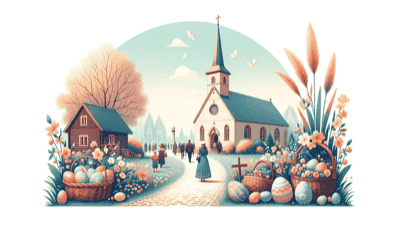We're here to help you keep count of the days to or since a date. Just click the button below and enter your chosen date to get started. Also choose the suggested days or search for a special day above #countingthedays

Easter Sunday in Poland, known as "Wielkanoc," is a significant holiday with deep religious roots and a rich tapestry of customs and traditions. It celebrates the resurrection of Jesus Christ and is a day filled with religious observance, family gatherings, and festive meals.
The celebration of Easter in Poland has evolved from early pagan rituals marking the spring equinox to its current Christian form. When Christianity arrived in Poland, these ancient customs blended with the new faith's traditions. Over time, uniquely Polish Easter customs emerged, influenced by both Western and Eastern Christian practices due to Poland's geographical location.
Polish Easter traditions are steeped in symbolism and family values:
Święconka: On Holy Saturday, Poles prepare "święconka," baskets filled with symbolic foods like eggs (representing new life), lamb (symbolizing Christ), bread, salt, and horseradish. These baskets are taken to church to be blessed.
Rezurekcja: A festive Mass known as "Rezurekcja" is held early on Easter Sunday to celebrate the resurrection. It often includes a procession and sometimes the release of doves.
Easter Breakfast: After Mass on Easter Sunday, families sit down to a ceremonial breakfast starting with sharing the blessed eggs from Święconka as a sign of unity and love.
Food: Traditional foods served include white sausage (biała kiełbasa), żurek (sour rye soup), mazurek (flat cake), babka (sponge cake), and cold cuts.
Activities on Easter Sunday are family-centric:
Family Gathering: The day focuses on spending time with family members. Often extended families come together for the ceremonial breakfast or dinner.
Easter Egg Hunt: Some families adopt the Western tradition of an Easter egg hunt for children.
On this day, Poles embrace both their faith's teachings about hope and renewal as well as their cultural heritage through shared meals and customs that have been passed down through generations.